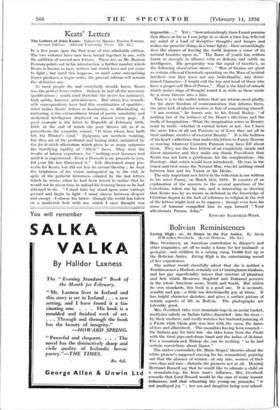Keats' Lettets
The Letters of John Keats. Edited by Maurice Buxton Forman. Second Edition. (Oxford University Press. 12s. 6d.) IT is five years since the first issue of this admirable edition. The two volumes have now been bound together in one, with, the addition of several new letters. There are, as Mr. Buxton Forman points out in his introduction, a further number which Keats is known to have written but which have not yet come to light ; but until this happens, or until some enterprising forger produces a bogus series, the present edition will remain the definitive one.
As most people do, and everybody should, know, Keats was the perfect letter-writer. Indeed, he had all the necessary qualifications : youth (and therefore the desire for intimacy), high spirits, humour, articulateness. But other, less remark- able correspondents have had this combination of qualities ; what makes Keats' letters so fascinating, so illuminating, so endearing, is the extraordinary blend of poetic sensibility and analytical intelligence displayed on almost every page. A good example is the letter to Reynolds of February 19th, 1818, at the end of which the poet throws off, as if in parenthesis, the exquisite sonnet, " 0 thou whose face hath felt the Winter's wind." Epigrams are nowhere wanting, but they are of the profound and lasting order, untainted by the fin-de-silcle affectation which gives to so many epigrams the horrifying rigidity of " lifted " faces. They were the results of intense experience, for " nothing ever becomes real iuntil it is experienced—Even a Proverb is no proverb to you, till your life has illustrated it." Life illustrated many pro- verbs for Keats, but did not lose its savour thereby ; he kept the brightness of his vision unimpaired up to the end, in spite of the pathetic bitterness exhaled by the last letters which he wrote, when he had been forced to realise that he would not be given time to unload his teeming brain as he had schemed to do. " I must take my stand upon some vantage ground and begin to fight—I must choose between despair and energy—I choose the latter—though the world has taken on a quakerish look with me, which I once thought was impossible ..." Yet : " how astonishingly (here I must premise that illness as far as I can judge in so short a time has 'relieved my mind of a load of deceptive thoughts and images and - makes me perceive things in a truer light)—How astonishingly does the chance of leaving the world impress a sense of its natural beauties upon us," The flame of youth has seldom burnt so strongly in alliance with so delicate and subtle an intelligence. His perspicuity was the equal of Goethe's, as the following observation shows : " Men of Genius are great as certain ethereal Chemicals operating on the Mass of neutral intellect—but they have not any individuality, any deter- mined Character—I would call the top and head of those who have a proper self Men of Power." That is the kind of remark which makes rings of thought round it as wide as those made by a stone thrown into a lake.
Thus it is to the earlier letters that one returns most gladly, for the sheer freedom of communication that informs them, the utter lack of ulterior motive or fear of committing himself. ". I am certain," he bursts out, to his friend Bailey, " of nothing but of the holiness of the Heart's affections and the truth of Imagination—What the imagination seizes as Beauty must be truth—whether it existed before or not—for I have the same Idea of all our Passions as of Love they are all in their sublime, creative of essential Beauty." It is the holiness of his heart's affections that makes his letters to Fanny Brawne so moving, whatever Coventry Patmore may have felt about them. They are the love letters of an exquisitely simple and direct character and they make one thank Providence that Keats was not born a gentleman, for the complications—the blurrings—that estate would have introduced. He was, in the truest and best sense, the Natural Man, who let nothing stand between him and his Vision. or his Desire.
The only important new letter in the collection is one written to his sister Fanny, on March 31st, 1819. It consists of an explanation of the answers to the several questions of the Catechism, taken one by one, and is interesting as showing that Keats was by no means as deficient in the knowledge of Christian dogma as the lack of reference to religion in the rest of the letters might lead us to suppose ; though even here his sense of humour- compelled him to sign himself " Youi affectionate Parson, John."
EDWARD *SACKVIaE-WEST. •














































 Previous page
Previous page